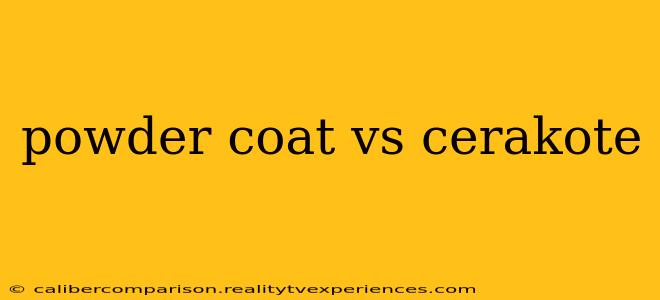Choosing the right finish for your project—whether it's a firearm, automotive part, or custom piece of furniture—can significantly impact its durability, appearance, and lifespan. Two popular options often top the list: powder coating and Cerakote. While both offer excellent protection and a wide range of colors, they differ in key aspects. This detailed comparison will help you decide which finish best suits your needs.
Understanding Powder Coating
Powder coating is a durable, decorative finish applied as a free-flowing, dry powder. It's an electrostatic process where the powder is sprayed onto a prepped surface, then cured in an oven at high temperatures, typically between 350°F and 400°F. This process melts and fuses the powder particles, creating a tough, chip-resistant coating.
Advantages of Powder Coating:
- Durability: Powder coating offers exceptional resistance to scratches, chipping, and abrasion. This makes it ideal for items exposed to harsh environments or frequent use.
- Cost-effectiveness: Generally, powder coating is a more budget-friendly option compared to Cerakote, especially for larger projects.
- Wide range of colors and textures: Powder coating offers a vast selection of colors, textures (e.g., smooth, textured, wrinkle), and even special effects like metallic finishes.
- Environmentally friendly: Powder coating is considered a more environmentally friendly process than traditional liquid paint, as it produces minimal volatile organic compounds (VOCs).
Disadvantages of Powder Coating:
- Less flexible: Powder coating is less flexible than Cerakote and can crack or chip more easily on items that bend or flex frequently.
- Thicker coating: The thicker nature of powder coating can obscure fine details or intricate designs.
- Oven curing required: The need for an oven to cure the powder limits its application to items that can withstand high temperatures.
Delving into Cerakote
Cerakote is a ceramic-based coating applied as a liquid and cured at lower temperatures than powder coating. It's known for its exceptional hardness, chemical resistance, and ability to adhere to a variety of substrates. Unlike powder coating, it's often applied in a more controlled environment with specialized equipment.
Advantages of Cerakote:
- Superior hardness and durability: Cerakote is exceptionally hard and resistant to scratches, abrasion, and chemicals. It’s often the preferred choice for high-performance applications.
- Thin and uniform coating: Cerakote's thin application preserves fine details and intricate designs, making it suitable for delicate items.
- Excellent adhesion: Cerakote adheres exceptionally well to a variety of surfaces, including metals, plastics, and composites.
- Flexibility: Cerakote is more flexible than powder coating, making it better suited for items that experience bending or flexing.
- Wide range of colors and finishes: Similar to powder coating, Cerakote offers a wide variety of colors and finishes.
Disadvantages of Cerakote:
- Higher cost: Cerakote is significantly more expensive than powder coating, particularly for larger projects.
- Specialized application: Cerakote requires specialized equipment and training for proper application, making DIY projects more challenging.
- Lower temperature curing: While the lower curing temperature is an advantage in some respects, it might not be as effective at creating the same level of hardness as powder coating in certain conditions.
Powder Coat vs. Cerakote: The Verdict
The "best" finish depends entirely on your specific needs and priorities.
-
Choose powder coating if: You need a durable, cost-effective finish for a large project with simple designs and can tolerate a thicker coating. Its ease of application (when done professionally) and environmental friendliness are also strong selling points.
-
Choose Cerakote if: You need a superior, highly durable finish for a project with intricate details or that requires flexibility and superior chemical resistance. While more expensive, its superior performance in demanding applications often justifies the cost.
Ultimately, careful consideration of your budget, the project's requirements, and the desired finish is crucial for making the right decision. Consulting with a professional finisher can provide invaluable insight and ensure the best possible outcome.

